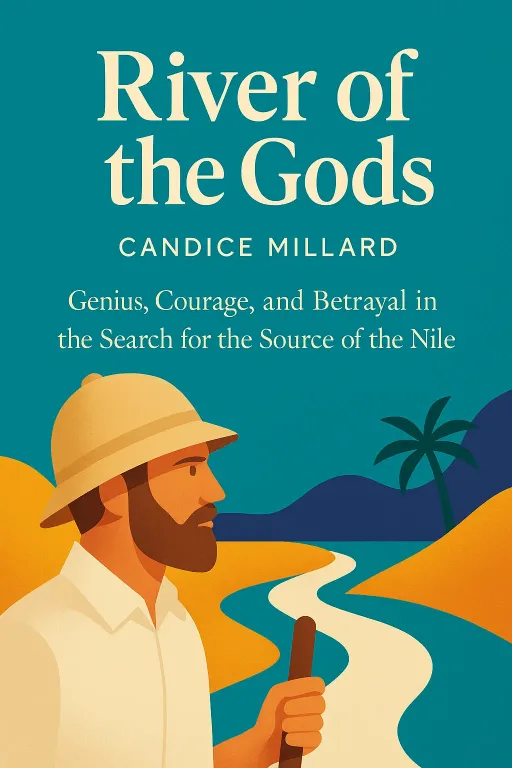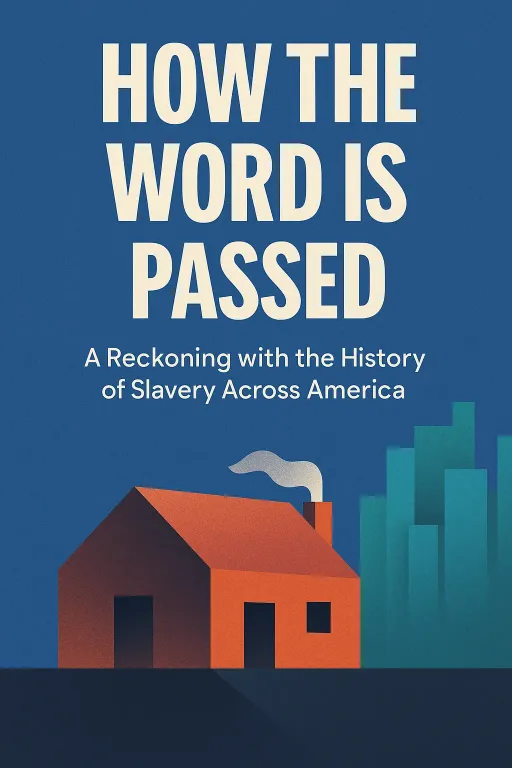
River of the Gods
10 minGenius, Courage, and Betrayal in the Search for the Source of the Nile
Introduction
Narrator: Imagine two men, once partners who had survived a bloody attack and sworn a bond in blood, now standing as bitter rivals. They are in Bath, England, in 1864, set to publicly debate the answer to a mystery that has captivated the world for millennia: the true source of the Nile River. The hall is packed, the anticipation electric. But just hours before the debate begins, news arrives that one of them, John Hanning Speke, has been found dead in a nearby field from a single gunshot wound. Was it a tragic hunting accident, or did the pressure of facing his brilliant, formidable rival, Richard Francis Burton, lead to a more desperate act?
This dramatic moment is the culmination of a story of breathtaking courage, obsessive ambition, and devastating betrayal. Candice Millard’s book, River of the Gods, masterfully reconstructs this epic quest, revealing not just how the Nile was found, but the profound human cost of the discovery.
The Audacious Outsider
Key Insight 1
Narrator: The quest for the Nile’s source required a leader of almost superhuman capability, and in the mid-19th century, no one fit that description better than Captain Richard Francis Burton. He was not a conventional English gentleman. Described as having "the jaw of a devil and the brow of a god," Burton was a phenomenal linguist who mastered over twenty-five languages, a master swordsman, and a cultural chameleon with an insatiable curiosity for what was forbidden.
To understand his character, one need only look at his journey to Mecca in 1853. At a time when the holy city was completely forbidden to non-Muslims, Burton conceived a plan to infiltrate it. This was no mere tourist adventure; discovery meant certain death. He meticulously transformed himself into Shaykh Abdullah, an Afghan-born doctor. He not only perfected his Arabic but also underwent circumcision and immersed himself in the most intricate details of Islamic theology and ritual. He knew that any mistake, as he later wrote, "a misjudged word, a prayer or bow, not strictly the right shibboleth," would mean his "bones would have whitened the desert sand." He succeeded, entering Mecca, performing the Hajj, and returning with unparalleled knowledge of "Moslem inner life." It was this combination of obsessive preparation, intellectual brilliance, and raw nerve that made him the Royal Geographical Society’s choice to solve "the problem of all ages."
A Partnership Forged in Disaster
Key Insight 2
Narrator: For his first attempt to reach the Nile's headwaters, Burton organized an expedition into Somaliland in 1854. As his second-in-command, he chose John Hanning Speke, a man who was in many ways his opposite: a conventional English officer, less intellectual but a skilled hunter and surveyor. Their partnership began with a "bond for our blood," an oath of loyalty for the dangerous journey ahead. That bond would soon be tested by horrific violence.
While camped at Berbera, awaiting the right season to push inland, their expedition was ambushed in the dead of night by a force of Somali warriors. The attack was swift and brutal. One of their party was killed instantly. Burton, fighting fiercely, took a javelin through his face, the spear entering one cheek and exiting the other, pinning his jaws together. Speke was captured, stabbed eleven times, and left for dead. Miraculously, both he and Burton survived and escaped. This shared trauma should have solidified their bond, but instead, it planted the seeds of resentment. Speke felt Burton had underestimated the danger, while Burton was frustrated by the expedition's failure. This disastrous first chapter set the stage for the far greater drama to come.
The Agony of Discovery
Key Insight 3
Narrator: In 1857, Burton and Speke set out again, this time from the east coast of Africa, on what would become the definitive expedition. The journey was an unrelenting nightmare. They and their porters, led by the steadfast guide Sidi Mubarak Bombay, were ravaged by disease, desertion, and near-starvation. Both Englishmen were pushed to the absolute limits of human endurance. Burton was crippled by a fever that left his legs paralyzed, and Speke was rendered temporarily blind by a severe eye infection.
When they finally became the first Europeans to lay eyes on Lake Tanganyika, a vast inland sea, the moment was steeped in agony. Burton had to be carried on a litter, too weak to walk, and his vision was so blurred he could barely see the magnificent vista. Speke, his own eyes inflamed, saw little more. After partially recovering, they heard tales of another, even larger lake to the north. While Burton was too ill to continue, he sent Speke to investigate. Speke marched for weeks and eventually stood on the shore of an immense body of water he named Victoria Nyanza, now known as Lake Victoria. In a flash of intuition, he became convinced that this lake, not Tanganyika, was the true source of the Nile. Burton, however, was deeply skeptical, demanding more proof. This disagreement over geography became the fracture point of their relationship.
The Great Betrayal
Key Insight 4
Narrator: On their return journey, the two men were barely on speaking terms. They agreed to travel back to England separately and present their findings jointly to the Royal Geographical Society. It was a gentleman's agreement, one that Speke had no intention of honoring. Arriving in London first, Speke went directly to the head of the Society, Sir Roderick Murchison, and declared that he, and he alone, had discovered the source of the Nile.
The press and the public, hungry for a hero, embraced him. Speke became a national celebrity overnight. When Burton finally arrived home, still weak and bearing the scars of their journey, he was shocked to find that his partner had betrayed him, stolen his glory, and publicly discredited his theories. A bitter and very public feud erupted. The conflict was set to climax at a meeting of the British Association in Bath, where the two were scheduled to debate their opposing views. But on the morning of the debate, Speke went out to his cousin's estate to hunt partridges. A short time later, he was found dead, his own gun having discharged into his chest. The official verdict was an accident, but the timing left a permanent, haunting question mark over the end of his life and his rivalry with Burton.
The Tangled Legacies of Exploration
Key Insight 5
Narrator: In the end, Speke was right. Lake Victoria is the main source of the White Nile. But history is not always kind to the correct. Speke’s fame quickly faded, his name overshadowed by the more charismatic and controversial Burton. Worse, his legacy is permanently stained by his embrace of the "Hamitic hypothesis," a racist theory suggesting that a superior, lighter-skinned race had brought civilization to Africa. This idea would later be used by colonial powers to justify their rule and tragically contributed to the ideology that fueled the Rwandan genocide.
Burton, though wrong about the Nile, became a cultural legend. He spent his later years in minor consular posts, feeling neglected by the empire he had served, and poured his genius into controversial translations of texts like The Arabian Nights and The Kama Sutra. His life ended as dramatically as it was lived. After his death, his devoutly Catholic wife, Isabel, burned his final, and potentially most lucrative, manuscript—a translation of The Scented Garden—believing its erotic content would damn his soul. Meanwhile, the true hero of the expedition, the guide Sidi Mubarak Bombay, who went on to help Henry Stanley find Dr. Livingstone, remained a footnote in the history he was so instrumental in making.
Conclusion
Narrator: River of the Gods reveals that the search for the Nile's source was never just a line on a map. It was a profoundly human drama, driven by the collision of titanic egos, scientific curiosity, and the brutal realities of imperial ambition. The book’s most powerful takeaway is that the story of discovery is inseparable from the story of the discoverers, with all their flaws, prejudices, and passions.
The intertwined fates of Burton, Speke, and Bombay force us to ask who history chooses to remember and why. It’s a stark reminder that the narrative we inherit is often shaped less by the quiet truth of a fact and more by the power of a compelling story, the tragedy of a bitter rivalry, and the enduring charisma of a flawed genius.









